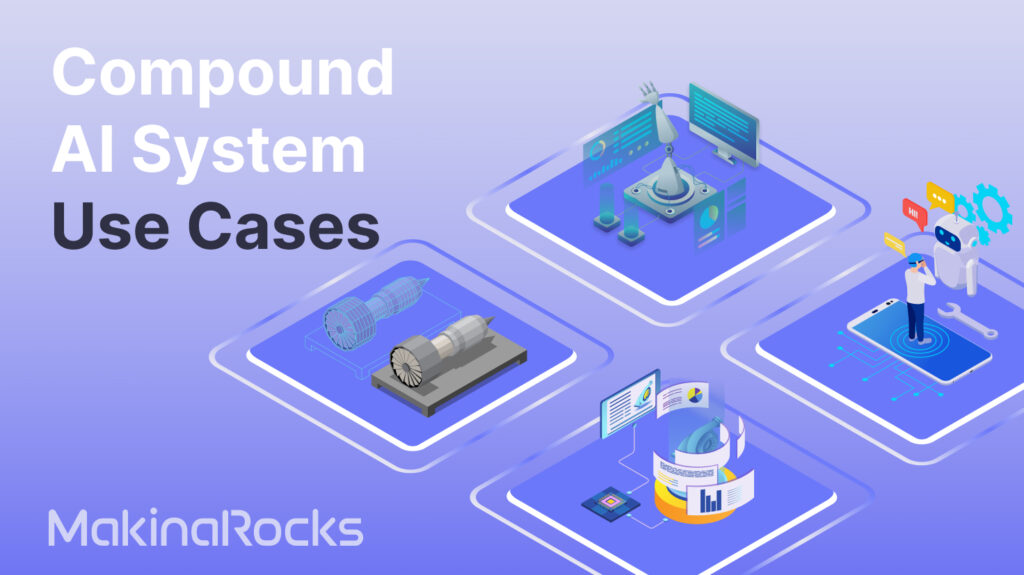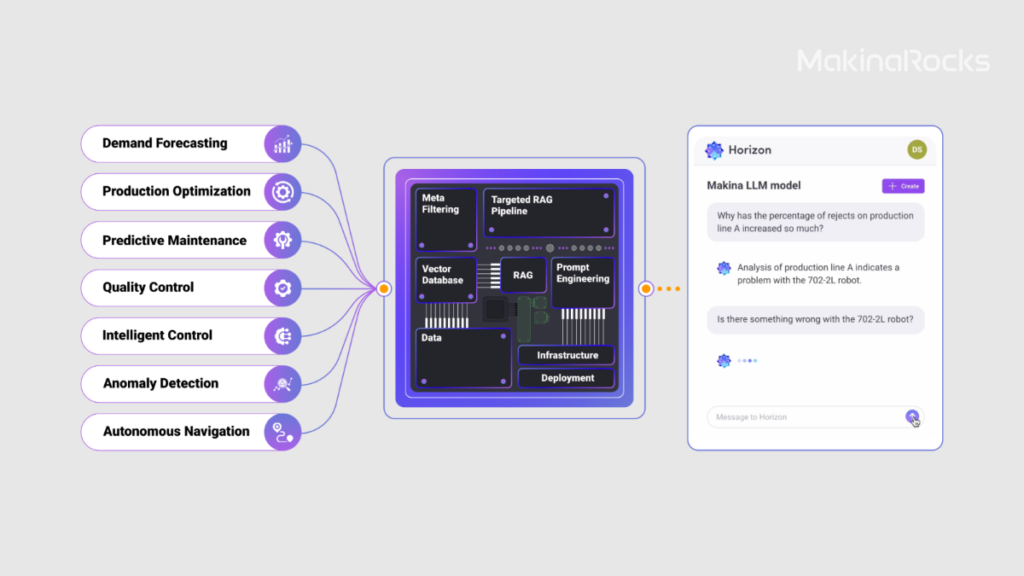
In the early days of AI, the vision was to create a single, all-encompassing AI model capable of delivering end-to-end solutions for any challenge. While general-purpose AI models in digital environments have come close to achieving this, serving millions of users effectively, MakinaRocks’ experience in the industrial sector has revealed that solving real-world challenges requires a more nuanced approach.
By dividing AI models based on the data they handle and their specific functions—and enabling these models to collaborate seamlessly—compound AI systems provide a deeper understanding of industrial challenges and deliver systematic, scalable solutions.
🔗 Simplifying industrial complexity with compound AI systems
The rise of Large Language Models (LLMs) has accelerated the adoption of compound AI systems. Tools like ChatGPT have showcased the transformative potential of LLMs, inspiring companies to explore how this power can be harnessed for meaningful business impact. This shift has driven the development of AI applications built on domain-specific LLMs. Central to these advancements are compound AI systems, which combine the capabilities of LLMs with diverse approaches—such as heterogeneous data integration, fine-tuning, retrieval-augmented generation (RAG), and prompt chaining—to achieve outcomes that exceed the capabilities of standalone models.
So, how are compound AI systems revolutionizing industries, and what role do LLMs play in this evolution? Let’s explore real-world applications and their tangible impact.
Industrial LLM: Understanding the complexity of the industrial world
 Industrial LLMs streamline and revolutionize tasks across the industrial sector.
Industrial LLMs streamline and revolutionize tasks across the industrial sector.
Creating an effective industrial LLM requires more than training a single model—it necessitates a robust compound AI system. For instance, MakinaRocks’ industrial LLM processes the vast and diverse data generated in industrial environments, including raw data from ERP, MES, and SCM systems, as well as numerical outputs from sensors and equipment.
To make this data usable, MakinaRocks transforms it into structured metadata that LLMs can effectively learn from. When combined with AI agents, these systems go beyond analysis, addressing critical challenges such as optimization, predictive analysis, and predictive maintenance with precision and scale unmatched by standalone models.
Effective problem-solving in industrial environments also requires the seamless integration of models tailored to specific tasks. Compound AI systems excel at this by creating a dynamic ecosystem where AI models, LLMs, APIs, and Vector DBs collaborate in harmony. Within this ecosystem, AI agents work together not only to generate insights but also to take meaningful, actionable steps. This holistic approach ensures scalability, precision, and efficiency, even when tackling the most complex industrial challenges.
To illustrate, imagine a piece of industrial equipment showing early signs of an anomaly. An AI model identifies the issue proactively, prompting the operator to consult a chatbot for further insights. The chatbot’s search agent retrieves relevant data and examples, helping to pinpoint potential causes. Simultaneously, the analysis agent delves into the company’s legacy systems—such as ERP and MES—to investigate the anomaly further and determine its root cause. Armed with this information, the operator requests the control agent to generate the necessary code to address the issue. Finally, the system executes the commands, resolving the problem and preventing costly downtime.
This collaborative, multi-agent process showcases the transformative power of compound AI systems. By automating complex workflows and enabling AI agents to interact seamlessly, these systems streamline problem-solving and significantly enhance operational efficiency. Instead of offering isolated insights, they deliver actionable, real-world solutions tailored to industrial needs.
Robotics: Harnessing the Power of Compound AI Systems
Compound AI systems are rapidly gaining traction as transformative solutions for tackling increasingly complex challenges with broader scopes and requirements. Since 2022, MakinaRocks has partnered with Hyundai Motor Company to develop the Robot Predictive Maintenance System (RPMS). In the first year of the collaboration, MakinaRocks developed an autoencoder-based anomaly detection model, which was applied to two robots. Building on this foundation, the team created an AI model for robot motion quality analysis, capable of performing detailed evaluations by integrating parameters of robot motion.
As the project progressed, the number of robotic arms using the AI models grew to over 200. Managing such a large number of models across multiple robots required a robust system, which was implemented on 🔗Runway, MakinaRocks’ AI platform. Powered by Runway’s MLOps capabilities, this system automated critical processes, including AI model training, inference, and retraining.
The adoption of AI also expanded to include a variety of robotic arm brands, each with unique data collection formats. To address this challenge, a data preprocessing standardization module was introduced, enabling the system to unify data collection across brands while maintaining compatibility with existing formats. Within the RPMS compound AI system, anomaly detection models and robot motion quality analysis models work together seamlessly, complementing each other’s strengths. This synergy provides operators with warnings at least five days before potential failures, enabling proactive measures to prevent downtime. As a result, productivity increases significantly, while operational disruptions are minimized.
But that’s not all. The RPMS compound AI system can also integrate LLMs to further enhance its functionality. By incorporating LLMs and leveraging retrieval-augmented generation (RAG), as well as implementing chatbot features, users can quickly access insights by asking questions—eliminating the need to manually review lengthy reports. All of this can be managed on MakinaRocks’ Runway, which features 🔗LLMOps capabilities to streamline the deployment and management of LLM models with optimized runtime and serving infrastructure.
Compound AI systems represent a game-changing advancement in AI technology, especially when combined with industrial LLMs. Their flexibility and ability to analyze diverse data in real-time enable more efficient and effective problem-solving. Beyond these advancements, these systems are solving critical challenges such as product design generation and PLC code conversion automation. While we can’t share every success story, the most important takeaway is how compound AI systems can be tailored to solve your unique challenges through customized configurations and operating models. Curious about how we can help? Click the banner below to start a conversation—we’d love to discuss your challenges and explore tailored solutions together!
Note: This post was translated from the original Korean version by Kyoungyeon Kim.